25. January 2021 | Labour Market Trends and Forecasts
Smoothing labour market transitions in times of crisis and beyond
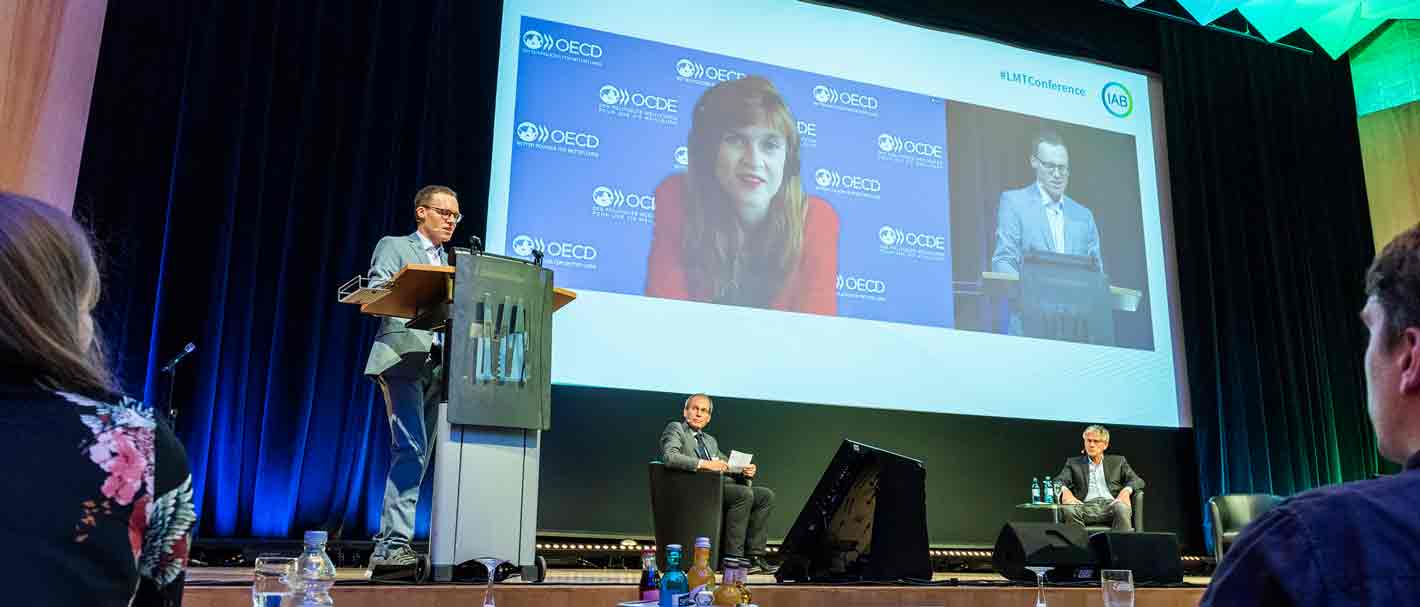
To expand the boundaries of knowledge about the importance of the labour market for individuals’ lives and the role of governments, the conference highlighted various forms of transitions such as transitions from school to work, from unemployment to work, from parental leave to work, transitions into retirement and between jobs or occupations, and not least transitions due to technological change.
In order to bring together researchers and policy makers, the conference provided a forum to present the perspectives of outstanding scientists and of key decision makers engaged in EU labour market policy. Mr Stephan Heuke, Deputy Head of International Affairs at the headquarters of the Federal Employment Agency, and IAB director Bernd Fitzenberger, opened the conference with their welcome addresses. Scientific keynotes were given by Jutta Allmendinger, President of the WZB Berlin Social Science Center and Professor of Educational Sociology and Labour Market Research at the Humboldt University Berlin, and Christian Dustmann, Professor of Economics at the University College London and Director of CReAM (Centre for Research and Analysis of Migration). Political keynotes were held by Dennis Radtke, Member of the European Parliament, and László Andor of Corvinus University of Budapest and former EU Commissioner for Employment, Social Affairs and Inclusion. About 40 papers were presented in 12 sessions. The conference concluded with a panel discussion with Dr Nicola Brandt, OECD Berlin Centre, and Norbert Schöbel, EU Commission’s Directorate-General for Employment, Social Affairs and Inclusion, Christian Dustmann, and Bernd Fitzenberger on “Vocational Training and labour market transitions: The future model for Europe?”.
Stephan Heuke: “One tragic consequence of the Covid-19 pandemic seems to be a genuine mistrust against science as a guide to political decisions”
In his short welcome address at Meistersingerhalle, Mr Stephan Heuke, Director and Deputy Head of International Affairs at the headquarters of the Federal Employment Agency in Nuremberg, stressed the premiere character of the event and showed his pleasure that the IAB had found a hybrid form, so that this long-planned conference could still take place. He welcomed the conference participants to the famous Meistersingerhalle in Nuremberg and touched upon its design that was meant to make cultural experience and democratic exchange more accessible for everybody, not only for the rich.
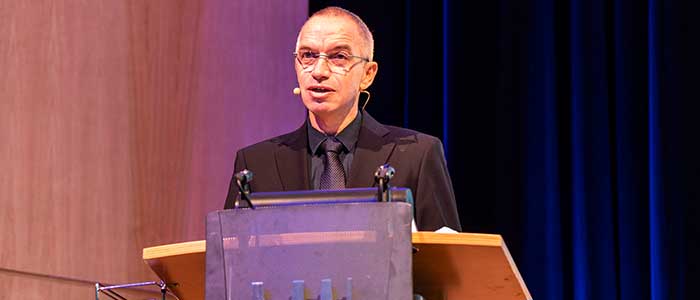
Stephan Heuke, Director and Deputy Head of International Affairs
Mistrust against science as a guide to political decision
Speaking of democratic exchange, Heuke brought up one tragic consequence of the COVID-19 pandemic: the rising mistrust of parts of the public and the political spectrum against science as a guide to political decision making. He said it was necessary to pay attention and to prevent this from evolving into genuine scepticism against science or even modernism as a common ground. He said that sharing scientific findings not only inside the community but also with the broader public was more important than ever. Heuke assured that the Federal Employment Agency relied on scientific findings when choosing the right labour market policies according to the specific social and economic situation of a country or region. According to him, experience showed that this was the only reasonable approach to make a real impact on labour market performance and social stability. He added that systematic and neutral evaluations of instruments and policies were also the only justification for spending as much money on active labour market policy as Germany used to do. Heuke assured that evaluations would show their value again when measures Germany took to mitigate the actual crisis would be discussed in the future. Many of the applied measures were based on experience and evaluations of measures the Federal Employment Agency had taken during the financial crisis of 2008/2009 or after the German reunification in 1990, such as the short-time work allowance scheme.
Please click here to watch the video of Stephan Heuke’s welome address:
https://youtu.be/t9c99k7xy6w
Bernd Fitzenberger: “We observe some worrying developments that threaten the apprenticeship system”
In his welcome address, IAB director Professor Bernd Fitzenberger, PhD, outlined the difficulties of transitions in pandemic times, since the labour market kind of froze in this crisis situation. According to him, people applied individual strategies to cope with transitions and government implemented policies to ease transitions, such as the apprenticeship in Germany.
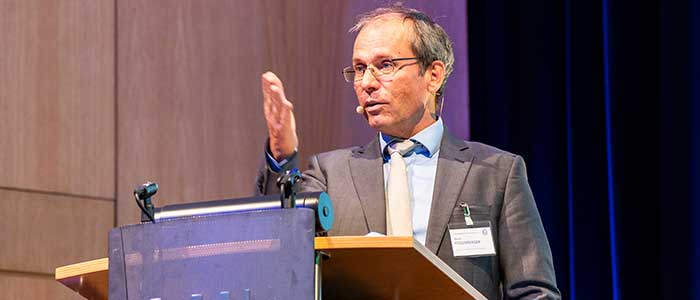
IAB director Prof Bernd Fitzenberger, PhD
To set the scene for the conference from a German perspective, Fitzenberger discussed some issues of interest regarding the vocational system in Germany. He said the apprenticeship system was traditionally the most important route for school-to-work transitions for non-college-bound youths. This is, according to him, the reason for the low youth unemployment rates in Germany. However, Fitzenberger is concerned about the future: “We observe some worrying developments that threaten the apprenticeship system.” Firstly, the firms’ willingness to offer apprenticeships is declining. In addition, there is a gender and migration bias: Less than 50 percent of apprentices are female, with exceptions in certain sectors such as healthcare or nursing, and the migrants’ interest in obtaining a vocational degree is lower. Besides, the age at which vocational training is started is increasing, since there is a tendency to remain in school longer, even more so in crisis situation such as the COVID-19 pandemic. Finally, he said, a sizeable share of lower-qualified youths ends up without a vocational degree resulting in poor future labour market perspectives.
School-to-work transitions of low-qualified youths
In this context, Fitzenberger highlighted three exemplary research papers by the IAB. Firstly, the study about vocational training measures in the school-to-work transitions of lower-qualified youths in Germany by Juliane Achatz, Kerstin Jahn, and Brigitte Scheels. The special quality of the study is its life course perspective. The authors of the study found out that there is a small number of youths experiencing at-risk trajectories characterized by a highly discontinuous transition process. Prevocational training combined with alternative vocational training programmes seemed to help school-to-work transitions of low-educated school leavers. The ongoing research at the IAB will take into account how transition patterns are related to labour market outcomes and analyse changes of patterns of school-to-work transitions in the light of changing macro conditions.
Survey results from school closings during the COVID-19 pandemic
With the second study by Silke Anger and six colleagues, Fitzenberger presented findings from German upper track high school students while schools were closed during the COVID-19 pandemic. The researchers had the chance to interview the students on their school-closing experience during the pandemic while evaluating a newly introduced additional career counselling programme of the Federal Employment Agency, which was a nice side effect. With regard to study time during school closings, the analysis came to mainly three conclusions: male students studied less than female students, high performing students studied more, and the frequency of receiving digital learning opportunities played an important role in how much students studied. Considering worries about their future career due to school closings, female students were more concerned about academic performance and their future career. Earlier studies with experimental settings had also shown this higher risk aversion among female students. Low-performing students were more concerned about academic performance and future career. The results show a risk of entering into a vicious circle of rising inequality.
No way out or no way in due to standardization and licensing?
Fitzenberger presented a third study entitled “No way out or no way in? The effect of standardization, licensing, and skills specificity of the initial and target occupation on status mobility“ by Basha Vicari and Stefanie Wagner. During this study, the authors looked at transition patterns between occupations. They investigated how these aspects hinder or enhance occupational mobility and found out that they make a huge difference. Characteristics of initial and target occupation affected mobility. Mobility was higher when factor barriers were found in the initial or in the target occupation but not in both. Mobility was lower when some factors applied to both. The largest effect on mobility was stated for licensing and skill specificity.
Please click here to watch the video of Bernd Fitzenberger’s scientific welome address:
https://youtu.be/py-LENLd69Q
Jutta Allmendinger: “The young generation, in particular, will have long lasting scars from the COVID-19 pandemic”
Jutta Allmendinger, President of the WZB Berlin Social Science Center and Professor of Educational Sociology and Labor Market Research at the Humboldt University Berlin, looked at the COVID-19 pandemic from the perspective of life course theories. She argued that the term “generation Covid” or “generation z(oom)” often used in newspapers was wrong, since not only the young were affected. She said that this is more of a period effect that affects everybody than a cohort effect that affects only the young. Nonetheless, she made the point that the young generation in particular will walk away with long-lasting scars. According to her, the Covid-19 crisis has manifold consequences: rise of unemployment, loss of work time, retirement, homework distribution. However, she said it was more than that. Many studies analysed the outcomes and impacts of the crisis in terms of satisfaction, loneliness, participation and integration with family formation, fertility, divorce rates, and death.

Prof Dr h.c. Jutta Allmendinger, PhD, President of the WZB Berlin Social Science Center
In her keynote, Allmendinger gave an overview of various studies on the effects of the pandemic crisis. According to her, the pandemic does not hit all people to the same extent. Toddlers may really suffer most through their life course. They lost territory, interaction with strangers, and child care. As to school children, there is an increasing divide in education and competence attainment of children, depending on the household in which they grow up. Allmendinger used her family as an example: “My son and I, for example, got our high school certificate kind of pre-birth, because we were both raised in academic families and were quite unlikely not to do our Abitur.” She said that educated parents were capable of helping and took the time for home schooling. Less educated persons often felt ashamed of not being able to do so. The lack of education and the lack of increased competencies over the past seven months would not be healed in the next years to come, said Allmendinger. “Those will be long-lasting scars.”
Education is the key
Moving to the transition from school to vocational training, Allmendinger warned that poorly educated persons will not have the option to continue schooling. They are left looking at apprenticeships in the labour market, which might prompt huge misfits between the demand and supply side. Going further to the transition from training to work, she warned that youth unemployment is likely to increase more than it does now. As to people at work, also in these cases she considers education key: “Better educated workers are primarily working at home; poorly educated low-income workers are primarily in short-time work. A very clear division and clear split in the labour market.” Also household composition, sex and migrant status make a huge difference. However, one of the major challenges for Germany is, according to her, the emerging stronger divide between skilled and unskilled labour force. So far, educated people have benefited from better work conditions, higher income, larger networks, better health, and longer life expectancy. The other huge and long-known challenge, which has become obvious during the pandemic, is the need to improve the work conditions and wages of those employed in caring and other essential jobs. A long-known problem, said Allmendinger.
Workplace and social interaction
In her role as a sociologist, Allmendinger pointed to the risk of a further loss of social cohesion as military service, civil service, engagement in churches, or in political parties is declining. According to her, employment becomes more and more important as a place of social interaction. The workplace is where people meet and simply see how other people behave. This is the basis for developing trust and the foundation for democracy. Allmendinger suggested to develop equivalent places where people can meet. Germany has some starting point with initiatives like “Nachbarshilfe.de”. However, there is only little public support.
Challenges for research
Allmendinger was hard on her own guild. She said that the pandemic demanded hasty policy briefings. Research failed to even exchange the results before they presented them in the media and to politics. She said that this was not the way of successful science and to legitimize scientific results for the society. Science must not give the power to direct and classify scientific results to either politicians or to journalists. Scientists should first join their datasets, compare them, and try to figure out why one result differs from the other. Allmendinger suggested platforms which help to better organize the scientific community across disciplines and internationally.
Challenges for public policy
Allmendinger demanded to invest much more in digitalization, in combined ways of training children in a digital and a personal way, and develop ways of hybrid schooling – not only hybrid conferences. She called for more innovation for school children: “We invented so many smart things helping the labour market. Why not for schools?”
According to Allmendinger, education for the workforce is also important. Since short-time work tied people to the firms and slowed down the transformation of labour force, short-term work should be linked to further education. Since education was a very strong pillar of social policy, Allmendinger made a case for the introduction of education in all policy measures. Above all, she demanded to put families, children, and women first. She said the crisis could be a window of opportunities to do more with regard to equalized distribution of paid and unpaid working time, which in her view is the one and only goal of equality.
In her closing remarks, Allmendinger quoted a survey that shows the good things the COVID-19 crisis brought to about one third of the participants which they wanted to preserve: the positive effects on climate, the deceleration of life, more time for the family, more leisure time and the like. Allmendinger said she thought that those views should be taken seriously and be implemented in a new way of working and living in the future.
Please click here to watch the video of Jutta Allmendinger’s keynote:
https://youtu.be/MrzFyiBMwUU
Christian Dustmann: “Results generally suggest that higher business tax rates do not benefit workers”
Christian Dustmann, Professor of Economics at University College London (UCL) and Director of the Centre for Research and Analysis of Migration (CReAM), analysed the effects of changes in business taxation on firms, workers, and local labour markets in his keynote speech. Using data from Germany, he investigated how changes in local business taxes affect local labour markets, establishments, and workers.
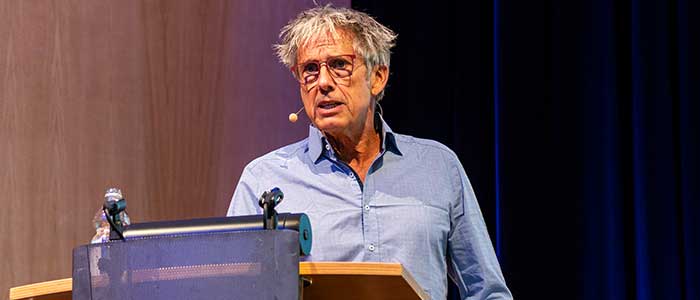
Prof Christian Dustmann, PhD, University College London (UCL) and Director of CReAM
The motivation for his paper – a joint work with Mimosa Distefano (UCL, CReAM) and Uta Schönberg (UCL, IAB, CReAM,) – was the observation of a general trend towards lower tax rates on firms’ profits (see Trump’s 2018 reform and discussions in the UK). These developments to cut taxes aim at creating jobs. The study exploits changes over time in firms’ business tax rates across municipalities in Germany. There were 7,299 changes in 9,207 municipalities between 1999 und 2014. The questions the researchers asked were: How does employment adjust? How do wages adjust? What is the source of wage adjustments? Which establishments respond more? The study concluded that an increase in the business tax rate of 1 % reduces municipality employment, overall mobility (inflow and outflow), municipality wages, establishment wages, and wage growth within and between establishments. The employment effects are stronger for larger establishments and for high-wage establishments. They reduce hiring. Workers are less likely to go to other firms and realise better matches. This development reduces wage growth, reduces mobility, hinders optimal matches, and reduces outside options.
Should business tax rates be low?
Dustmann stressed that his research was not a welfare analysis. A welfare analysis would have to take account of how the additional tax revenue is spent. Municipalities increase taxes to spend the revenue on building schools, hospitals and the like. He said that the conclusion from his study cannot be that increasing business taxes is necessarily always bad for welfare. However, Dustmann concluded: “Results generally suggest that higher business tax rates do not benefit workers who work in those municipalities.“ In part, this conclusion is driven by lower worker mobility due to a reduction in hiring, in particular by high-wage firms. Another part is the reduced mobility and reduced movements of workers up the job ladder.
Please click here to watch the video of Christian Dustmann’s keynote.
https://youtu.be/XyZhIySqRdI
Dennis Radtke: “Youth unemployment has been a problem in the EU for a long time”
Dennis Radtke, Member of the European Parliament with the European People’s Party since 2017 and coordinator of the parliamentary committee “Employment and social affairs”, gave an overview of the youth unemployment situation in the European Union. He stressed that “Youth unemployment has been a problem within the EU for a long time now.” According to him, especially the financial crisis had aggravated the struggle of young people to find a job or a training option. The COVID-19 pandemic enhanced this problem. He added that the financial crisis had shown that the youngest in society are always the biggest losers in times of crisis.
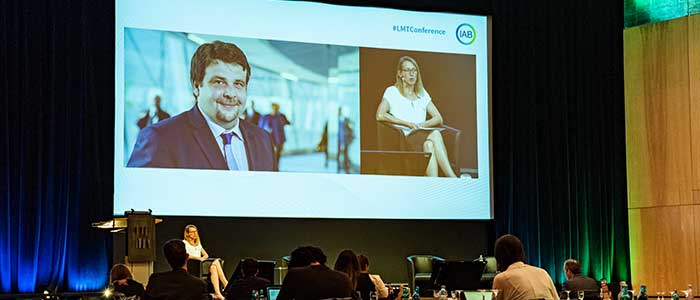
Dennis Radtke, Member of the European Parliament
Combating youth unemployment falls into the EU’s responsibility
Youth unemployment needs to be combatted since it affects the complete society. He said that on the EU level, discussions have arisen whether this is a topic to be decided on the EU level or whether this falls into the responsibility of the member states. However, in some member states, the problem is too huge. In Radtke’s view, it would be a fatal signal if the EU did nothing. He added that there are many social consequences that are connected to youth unemployment, such as psychological and health problems, social and cultural isolation, stigmatisation, family tensions and conflicts, alcohol and drug abuse. It can result in a vicious circle that does not only affect the young individuals themselves but at least also their family. Radtke demanded that young people must be prevented from sliding into this vicious circle and affected youth must be supported to be able to get out of it.
The new European programme to combat youth unemployment
In 2013, the EU launched the youth guarantee program. Although not all goals could be reached, Radtke considered it a success. Now, the EU commission is coming up with a new proposal to tackle youth unemployment. Before setting up the new programme, the previous programme is being evaluated. One important lesson learned was to assure quality standards for what is offered to young people: not short-time training but quality jobs and quality training. This approach corresponds to the European bill of social rights that the EU brought up, and to its national implementation. Another important lesson learned is that social partners need to be involved straight from the beginning.
Youth unemployment endangers democracy
Radtke lined out his personal motivation to combat youth unemployment, which is amounting to nearly 40 percent in some EU member states. He considered this situation a danger to democracy in Europe, not least since right parties have gained from such developments. Radtke said that he aimed at delivering a perspective and a worthy future for young people. Otherwise, democracy would be endangered.
Please click here to watch the video of Dennis Radtke’s keynote.
https://youtu.be/venTNRZeA94
Lázló Andor: “SURE is an effective fiscal muscle of the European Union”
Lázló Andor, Professor at the Corvinus University of Budapest and former EU Commissioner for Employment, Social Affairs, and Inclusion from 2010 to 2014, held a keynote speech on how to protect jobs and incomes in the pandemic crisis. He stressed how important it was to compare this crisis to previous ones. The great recession had been devastating for the economy and the labour market. He said the European politicians had learned the lessons from the past crisis. This time, the European response was quite different. It was one of solidarity in macroeconomic terms. The EU created a new budgetary tool which is capable of counter-cyclical interventions. In other words: capable of having a stabilizing function which historically has not been a task to be accomplished at the European level. It is now allowed to borrow money and to implement cross-country transfers. This is absolutely fundamental for macroeconomic stabilization and helps fostering economic recovery and employment.
The new European crisis response
Nothing symbolises this better than the new European instrument “SURE – temporary Support to mitigate Unemployment Risks in an Emergency”. In 2012, the EU had come forward with recommendations and also with programmes such as the Youth Guarantee Scheme. However, it was too late to provide any significant help in that crisis, said Andor. This time, the EU came forward fairly quickly with the new instrument “SURE”. The aim is to protect employment, Andor pointed out. “SURE” is not an unemployment benefit scheme. It is a temporary support scheme by the EU. The new tool is capable of providing fast aid from the EU. The budget amounts to 100 billion euro, comparable to the ESF plus budget. It is meant to complement national efforts that are a prerequisite in order to receive this additional support.
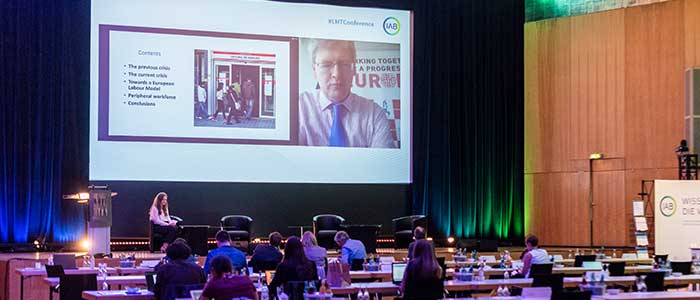
Prof Lázló Andor, PhD, Corvinus University of Budapest and EU Commissioner for Employment, Social Affairs and Inclusion (2010-2014)
An emerging policy consensus developed to a new European model
Andor stressed that “SURE is an effective fiscal muscle added to the recommendations of the EU to apply internal as opposed to external flexibility.” It demonstrates real solidarity with the member states. Two thirds of the states have requested support already. It is not a charity measure, but everyone believes in the economic gain. This is an emerging policy consensus on the European level developing to a new European model. Andor explained that in theory there are four possible ways to adjust to a shrinking demand for labour in a crisis: employment, work income, working time, or retirement. In the 1990s, the most common answer to a crisis was to reduce employment, called external flexibility. The experience from the previous crisis and policy evolution clearly led to a new conviction that working time is the most popular form of adjustment to shrinking demand for labour.
Andor demands a reinsurance system
The widely used short-time work scheme constitutes one layer of the safety net. In order to complete this net, Andor demanded a reinsurance system and EU legislation to support groups of peripheral workforce such as the young, precariously employed, or intra-member-states migrants. Andor concluded that in general, the EU had learned the lessons from past crises and has now a diverse toolkit at its disposal which has to be used and further developed.
Please click here to watch the video of Lázló Andor’s keynote:
https://youtu.be/YIav3WgBqkE
Panel discussion: Is the German apprenticeship system a blueprint for other countries?
As a highlight of the conference, four experts attending online as well as on site shared their experience of vocational training in Germany and other countries in a panel discussion hosted by Dr Tobias Kaiser (correspondent DIE WELT), and debated in what way the German model could be a blueprint for other countries.

Panel Discussion: Dr Tobias Kaiser (Die Welt), Prof Bernd Fitzenberger, PhD (IAB), Dr Nicola Brandt, Head of OECD Berlin Centre, and Prof Christian Dustmann, PhD (University College London and CReAM)
Nicola Brandt: “Employers need to invest”
Dr Nicola Brandt, Head of OECD Berlin Centre, who joined the discussion online from Berlin, pointed out the strength of the dual education system common in Germany, Austria and Switzerland. The elements of work-based training and engagement of social partners in shaping the content of the school curriculum resulted, according to her, in high employment rates for graduates, 88 percent in Germany, for instance. However, both employers and apprentices must be willing to invest here, she added. She said this was more difficult in Anglo-Saxon countries with very flexible labour markets, since such investments were not that profitable given the fact that persons trained by the employer often leave the enterprise after completing their training. She continued that in countries like Poland or the Czech Republic, most of the firms were much smaller than the German Mittelstand, making it difficult to handle the administrative task to engage with the school. Australia solved this by forming group training associations that organise hiring, engagement with schools, applying for subsidies and the like for small firms. In Austria and Norway, small firms teamed up and took on one apprentice together in order to provide all parts of the training.
Norbert Schöbel: “The European Union promotes vocational training across the member states”
Norbert Schöbel, Team Leader for Vocational Education and Training (VET) and Adult Learning at the EU Commission’s Directorate-General for Employment, Social Affairs and Inclusion (DG EMPL), who joined from Brussels, outlined the efforts of the European Union to promote vocational training across the member states, which was even more important considering the worrying rise of youth unemployment to 15 percent during the COVID-19 crisis. He said the European Commission adopted several documents aimed at creating a bridge between school and work and between youth unemployment and employment or apprenticeship, traineeship or education. He added that the new approach of the European Commission included supporting structures in member states where the governmental level and social partners work together. In particular, he considered the regional and local level as catalysts, not least since they were important employers themselves.
Schöbel presented a new model introduced by the public employment services: a combination of benchmarking and peer learning aimed at supporting member states in their reform process on apprenticeship.
Christian Dustmann: “Employers need to commit to training”
Dustmann brought up the question as to why Germany was successful in attracting many young people into training positions whereas the UK was struggling to develop an equivalent system. He pointed out that employers needed to commit to training and to this kind of investment, because the apprentices invested as well, since they received wages far lower than if they entered the labour market as unskilled workers. What they wanted in return, he said, was to learn something of value for the market that pays off. Dustmann said that in regular intervals there were attempts in the United Kingdom to improve the attractiveness of apprenticeship schemes by subsidizing employers to employ and pay for apprentices. Dustmann warned that this was not improving the quality of training. According to him, to make apprenticeship more attractive, it needed commitment, comparable examinations, comparable transparency devices, and commitment to quality.
In order to assure a certain degree of quality, Norbert Schöbel introduced the European framework with a set of 14 criteria on what the learning and working conditions should look like in order to assure high-quality and effective apprenticeships.
Bernd Fitzenberger: “A growing number of high school graduates aspire academic degrees”
Fitzenberger joined the discussion on site. Being “a big fan” of the apprenticeship system, he highlighted critical aspects of the German model in order to assure its survival. He pointed out that the willingness of firms to provide apprenticeships had been constantly decreasing over time. If firms committed to serious training, then they would not get the productivity out of the apprentice. The net costs of training would pay off in the future if firms attracted a sufficient number of good students from high school. He added that the success of the apprenticeship system was very much related to the decision of young people to use it. However, he said that a growing number of pupils aspired more academic degrees such as Abitur and tertiary education. Besides, the starting age had increased over the last couple of decades, he added. The young were concerned about picking up a specific occupation, though the labour market mobility showed that apprenticeships offer a broader knowledge base and not only specific knowledge. Fitzenberger said he was concerned about the possible developments in the wake of the COVID-19 crisis. During the financial crisis in 2008/2009, the number of apprenticeships supplied by firms decreased by about 10 percent and never recovered.
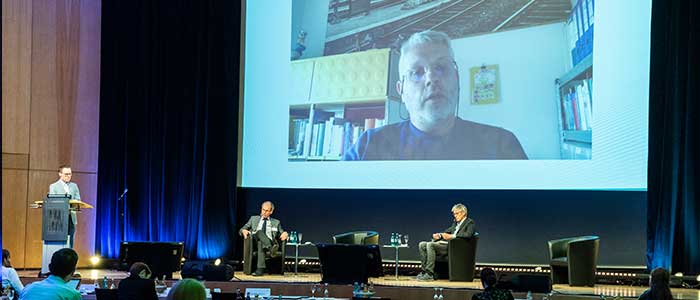
Panel Discussion: Dr Tobias Kaiser (Die Welt), Prof Bernd Fitzenberger, PhD (IAB), Prof Christian Dustmann (University College London and CReAM), and Norbert Schöbel (EU Directorate-General for Employment, Social Affairs and Inclusion)
Apprenticeship is considered an education path for losers
Norbert Schöbel pointed out that the apprenticeship system had an image problem in countries like Belgium where it was considered an educational path for losers. Nicola Brandt told the common joke that apprenticeships are always recommend to other people’s children, but never to your own. It was said that though the earning prospects of apprentices were lower than after tertiary education, apprentice graduates could continue with VET bachelor programs or a master craftman’s diploma.
A discussant from the University of Bamberg asked whether the system might reinforce existing inequalities especially with regard to class or migrant background. According to Nicola Brandt, people from lower socioeconomic background tended to enter vocational education and perhaps even stayed there. However, he said an important aspect was the bridges and opportunities for further studies during the career.
The apprenticeship system offers multi-dimensional skill development
Christian Dustmann pointed to the multi-dimensional skill development of the apprenticeship system as compared to the academic system. High school graduates who are good with spatial dimensions, creative and good with hands could not develop theses talents and skills in an academic system. They would be lost not only on the individual level but also for the society.
Bernd Fitzenberger warned that the apprenticeship system could only survive if it adapted to what was being used in practice and combined general and specific skills. The general skills would then also help graduates from the apprenticeship system to succeed in times of digital and technological change.
A discussant asked how the German system could be emulated in other countries. Nicola Brand answered that she would not recommend emulating it. However, countries with a largely school-based system could bring in employers who engage in defining the curricular in order to have a stronger workplace-based learning component.
Please click here to watch the video of the panel discussion:
https://youtu.be/CQRNadncrBk
Sessions
An important part of the hybrid conference was the twelve separate sessions in which 40 papers were presented. The topics included transitions into and from apprenticeship, (un)employment, and education, all chaired by Dr Malte Sandner. Dr Ute Leber chaired a session on job search and wages. Prof Dr Silke Anger chaired one on skills, technical change, and occupational mobility. A different mobility perspective provided the session on social mobility and poverty, chaired by Dr Alexander Patzina. Additional sessions on poverty – this time in the EU – chaired by Basha Vicari, and on migration, chaired by Dr Lisa Leschnig, provided an international perspective on labour market transitions. The specific sessions on transitions into retirement and into and out of parenthood were chaired by Dr Basha Vicari and Dr Lisa Leschnig.
Here you can find an overview and brief summaries of all 12 sessions.
Winters, Jutta (2021): Smoothing labour market transitions in times of crisis and beyond, In: IAB-Forum 25th of January 2021, https://www.iab-forum.de/en/smoothing-labour-market-transitions-in-times-of-crisis-and-beyond/, Retrieved: 24th of April 2025
Diese Publikation ist unter folgender Creative-Commons-Lizenz veröffentlicht: Namensnennung – Weitergabe unter gleichen Bedingungen 4.0 International (CC BY-SA 4.0): https://creativecommons.org/licenses/by-sa/4.0/deed.de
Authors:
- Jutta Winters

 Jutta Winters is scientific editor in the department “Media and Communication” at the IAB.
Jutta Winters is scientific editor in the department “Media and Communication” at the IAB.